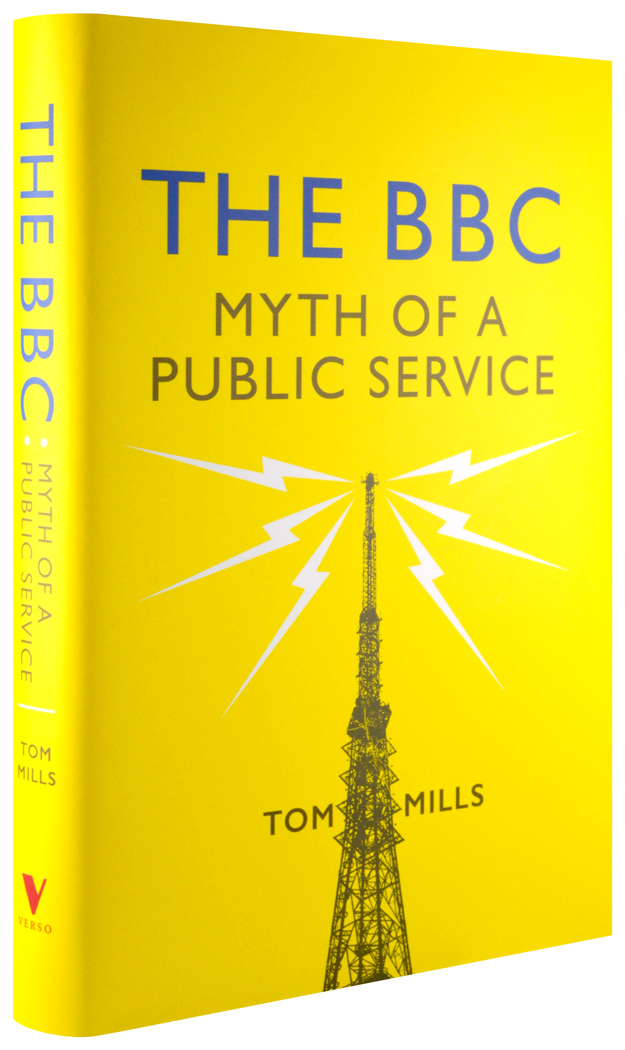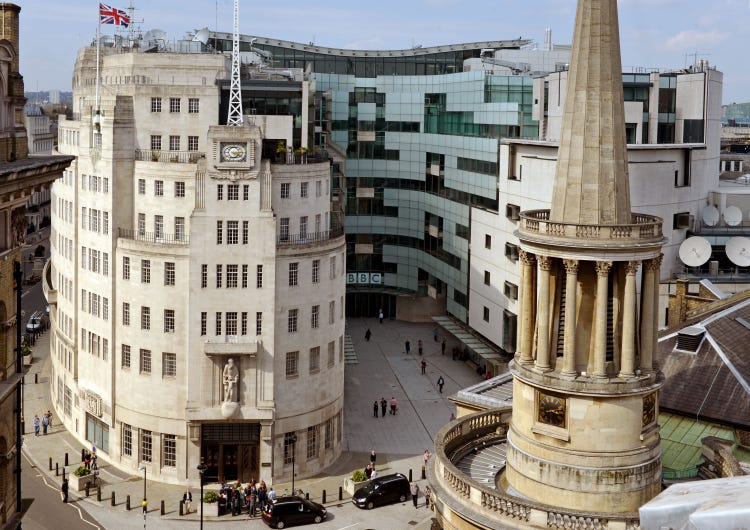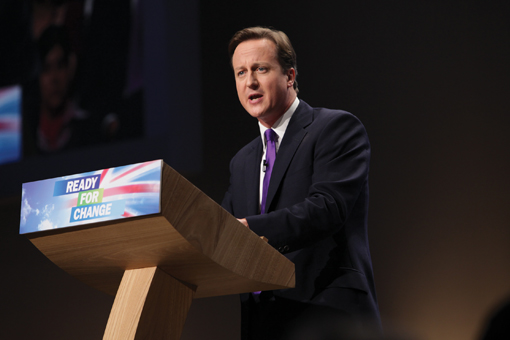by Tom Mills
This article first appeared in ViewFinder 106
When the BBC seemed under grave threat during the recent Charter Renewal process it was mainly its popular and uncontroversial entertainment shows and documentaries that were highlighted in defences of the embattled broadcaster. This is strong ground for the BBC. Despite occasional complaints about ‘dumbing down’ and periodic allegations of declining standards, it has maintained a strong reputation both in Britain and around the world for high quality cultural and educational programming. The Corporation’s news and current affairs output, along with broader questions over its political orientation, however, have always been more contentious matters.
One of the great myths of British public life is the notion that the BBC is biased to the left. This has been endlessly propagated by Britain's reactionary press, especially the Daily Mail and in recent decades the Telegraph. But it has also been driven by organised interests in and around the Conservative Party seeking electoral advantage or greater traction on particular issues.

Tom Mills' book, published by Verso.
The first organised political effort to monitor the BBC’s output and thereby pressurise its editorial policy was under Clement Atlee’s government when a unit headed by John Profumo was set up at the behest of Winston Churchill, then Leader of the Opposition who, according to Profumo, had paranoid suspicions about the BBC’s politics. The unit claimed some success at a time when the British state, and elite political culture, had shifted leftwards. Later claims of BBC bias were to become an important part of the conservative backlash against this more egalitarian culture and political economy, both amongst social conservatives and neoliberals.
The campaigner Mary Whitehouse – who, more than just an eccentric prude, headed a conservative movement that was for a time fairly influential – led the charge against the ‘permissive’ culture of the 1960s, focusing in particular on the BBC, which she blamed for the liberal and radical cultural shifts of that decade. Whitehouse’s efforts were praised by Keith Joseph when he headed the New Right faction of the Tory Party, and his successor Margaret Thatcher was sympathetic to Whitehouse’s petit bourgeois moralism. A similar animus about 1960s culture drove the Thatcherite Minister Norman Tebbit, whose high profile attacks on the BBC in the 1980s were so ferocious that he had to be reined in by 10 Downing Street, under pressure from more moderate Conservatives.
By that point the grumbling about the BBC’s liberal culture had combined with more sophisticated complaints about its funding and organisational structure which were rooted in the neoliberal critique of the social democratic state and the post-war political economy. This was a political initiative that was to bear more fruit. The 1985/86 Committee on Financing the BBC, headed by the neoliberal economist Alan Peacock, left the licence fee intact, and did not recommend that the BBC take advertising, as Thatcher had hoped. But the Committee’s recommendation that the BBC commission programming from the private sector, in combination with a radical and unpopular internal reform agenda at the Corporation, driven by fellow neoliberal John Birt, would transform the organisational structure and culture of the BBC, further integrating it into the market, and eroding its public service ethos. John Birt, who joined the BBC in 1987 and served as Director General for much of the 1990s, not only explicitly sought to transform the BBC in line with the new Thatcherite consensus, he also sought to curtail some of the more oppositional culture that had taken hold in the 1970s and 1980s by centralising editorial controls. Birt also shifted economics reporting away from social democratic approaches focusing on employment and on trade union politics, towards more technocratic economics reporting and explicitly pro-business perspectives – a long process of change that was even more marked under Birt’s successor Greg Dyke.
None of this brought an end to the political pressure on the BBC, which was particularly intense during the Blair years, nor to claims of political bias from the right. The private conservative outfit Newswatch has in more recent years produced a number of pseudo-academic reports for right-wing think tanks, and has been especially active in advancing claims of pro-EU bias at the BBC, with its assertions amplified by the conservative press and Eurosceptic wing of the Conservative Party.

BBC Broadcasting House
Allegations of political bias have of course also come from the left as well as the right – both from centrist and right-wing Labour politicians like Harold Wilson and Tony Blair, and from more radical figures in and beyond the Labour Party. In the 1970s the BBC was seen by much of the labour movement as a small ‘c’ conservative organisation, broadly hostile towards the left and the organised working class. More recently, the leftward shift of the Labour Party has seen supporters of Jeremy Corbyn complaining of bias at the Corporation, an allegation that seems at least partly vindicated by the BBC Trust’s recent ruling that an early report on Corbyn by the BBC’s political editor Laura Kuenssberg, who has been a particular focus of complaints, violated its rules on accuracy and impartiality.
BBC journalists, for their part, have often remarked they get attacked from ‘both sides’ and therefore they are probably striking the right balance. As Kevin Marsh, the editor of the Today programme at the time of the Gilligan report on the ‘sexed-up’ Iraq dossier, has remarked: ‘getting it in the neck with similar force from different directions at the same time tends to suggest some degree of impartiality’. Is this a fair conclusion to reach? Max Weber believed that we should ‘oppose to the utmost the widespread view that scientific “objectivity” is achieved by weighing the various evaluations against one another and making a “statesman-like” compromise among them.’ ‘Scientifically’, he argued, ‘the “middle course” is not truer even by a hair’s breadth, than the most extreme party ideals of the right or left.’ This is correct I think, and by adopting, albeit unofficially, the position that impartiality involves steering a midcourse between competing claims, the BBC has essentially adopted a relativist position whereby all allegations of bias are regarded equally valid, or invalid. This position also ignores the fact that different ‘sides’ in political discourse do not have the same resources and opportunities at their disposal to bring pressure to bear on the BBC.

Has the BBC been more biased towards the Conservatives in recent years? Image 2009 © Conservatives.
Can social science settle some of these disputes about the BBC’s political orientation? There is in fact a fairly substantive body of scholarly work on the BBC reporting, and none of it supports the ubiquitous claims from conservatives that the BBC is left-wing. One of the most extensive pieces of content analysis in recent years was conducted for the BBC Trust by Cardiff University. This research, amongst other things, examined the BBC’s coverage of immigration and the EU – two of the most divisive issues in British politics. What researchers found was that conservative perspectives were more prevalent in BBC reporting, and that while the balance between the two major political parties tended to be broadly equal, Conservative featured more regularly than Labour. This rightward leaning reporting has also been confirmed in analyses of guest appearances on programmes like BBC Question Time, and a forthcoming piece of research has confirmed that the right has a slight edge in terms of political guests on BBC programme, and interestingly that the BBC favours right-wing over left-wing Labour MPs, and the right of the Conservative Party over more moderate Tories – not quite the centre ground some have assumed that the BBC adopts. Academic research on the BBC’s coverage of the referendum by Loughborough and Cardiff, meanwhile, has found that while the BBC struck a careful balance between the two sides in the referendum, the whole debate was markedly dominated by the Conservatives and UKIP.
The best evidence, then, suggests that BBC reporting, far from being biased to the left, is slightly biased to the right. A more striking and consistent finding from scholarly research, though, is that the BBC overwhelmingly defers to official politics, taking its cue from Westminster and the broader world of elite policy making, and to a lesser extent business representatives. As I describe in some detail in my book, The BBC: Myth of the Public Service, these patterns of reporting reflect the extent to which the BBC has in practical terms always been subordinated to the institutions of the British state, but also the extent to which big business and conservative movements have successfully shifted its politics rightwards since the neoliberal turn of the 1980s.
About the Author:
Dr Tom Mills is currently Lecturer in Sociology and Policy at Aston University. Before joining the University in 2016, he was a researcher at the University of Bath where he worked on the ESRC funded project, 'Understanding and Explaining Terrorism: Expertise in Practice'. He completed his PhD research at Bath, examining how the collapse of social democracy and the rise of neoliberalism impacted on the BBC's organisational structure and culture. His work is principally concerned with the ideas and practices of powerful groups and actors, and the social networks which influence policy making.